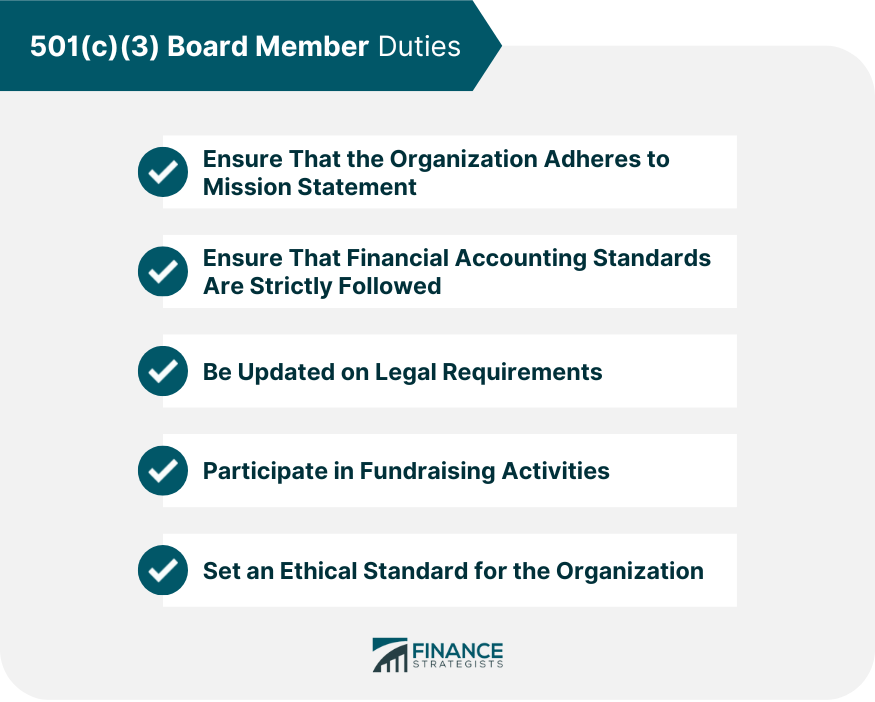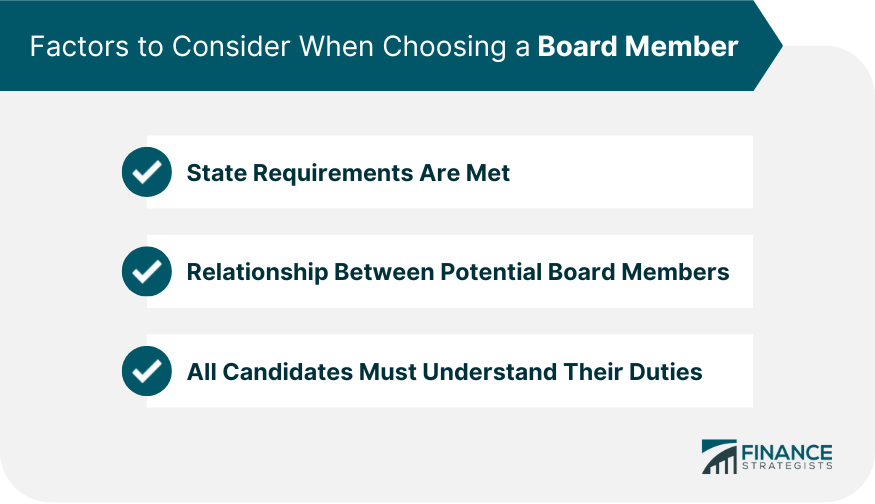501(c)(3) organizations are non-profit, charitable organizations that are recognized by the Internal Revenue Service and exempt from federal income tax. These organizations must be organized and operated exclusively for religious, scientific, literary, educational or charitable purposes (as defined in the IRS code). Charitable activities include relief of the poor, advancement of education and science, promotion of social welfare, improvement of public health, and similar endeavors. Contributions to 501(c)(3) organizations may be deductible for taxpayers who itemize their deductions. The IRS typically requires at least three board members for a 501(c)(3) organization. However, the IRS does not define the appropriate term length for these members. The full terms of a board member's duties and position must be outlined in the nonprofit bylaws. Non-profit organizations with 501(c)(3) status must have a board of directors that is responsible for overseeing its operations and making decisions. As such, all board members are charged with specific duties in order to fulfill the organization's mission and remain compliant with federal laws. Understanding the individual responsibilities of each board member is critical for any organization to succeed. The most basic responsibility of all 501(c)(3) board members is ensuring that the organization adheres to its stated mission and goals. This includes establishing organizational policies, setting budgets, and setting strategies for achieving success. They should also ensure that financial accounting standards are followed strictly, as well as stay up-to-date on legal requirements such as filing paperwork with the IRS. In addition to managing overall operations,501(c)(3) board members must also participate in fundraising activities if the organization needs additional resources. This may include grant-writing, developing relationships with potential donors, and applying for awards or grants from foundations or other sources. Finally, 501(c)(3) board members must act ethically at all times when representing their organization. This means being transparent about financial information, honoring donor requests or commitments, and avoiding conflicts of interest among board members or staff. By fulfilling these duties responsibly, 501(c)(3) organizations can ensure compliance with federal regulations while carrying out their charitable mission effectively. When selecting members for a 501(c)(3) board of directors, there are many factors to consider. It is important to choose individuals who will act in accordance with the organization’s mission and fulfill their fiduciary duties ethically. The first factor to consider when selecting a 501(c)(3) board member is the state requirements that must be met. Depending on the type of non-profit organization you are forming, certain qualifications may be necessary for a person to serve on the board. For example, some states require that at least one board member have professional experience in accounting or financial management. It is imperative to do your research and make sure all candidates meet any relevant state requirements. The relationship between potential board members should also be considered. It is essential for each individual to work together as a cohesive unit in order to achieve the organization's goals, so it is vital to choose people who can collaborate effectively and whose personalities complement each other well. Finally, all potential candidates should understand their fiduciary duties as members of the 501(c)(3) board. This includes understanding legal requirements such as filing paperwork with the IRS, remaining accountable for their actions, and protecting the interests of those they serve (the “beneficiaries”). This can help ensure that any decisions made by the board are consistent with federal regulations while still carrying out its charitable mission effectively. By considering these factors when selecting a 501(c)(3) board member, organizations can ensure they are making an informed decision and choosing someone who will help further their cause responsibly and ethically. When forming a board of directors for a non-profit organization with 501(c)(3) status, it is crucial to choose individuals who will act in accordance with the organization’s mission and fulfill their fiduciary duties ethically. While there are certain contractual roles that may be required of potential board members, there are also some individuals who should not serve on the board due to potential conflicts of interest or other issues. One type of person who should not be chosen as a board member is anyone with a conflict of interest that could affect their judgment when making decisions. This includes people who have extensive financial ties to the organization or any relationships that could be seen as giving them preferential treatment. Any potential board member should be willing to declare any conflicts before joining the board so that they can be addressed accordingly. In addition, those with any kind of criminal background should generally not serve on the 501(c)(3) board. This includes individuals convicted of money-related crimes or those who have been found guilty of fraud or other forms of misconduct. Such individuals can bring significant risk to an organization and may cause reputational damage if found out after an appointment. As such, it is vital to conduct thorough background checks before selecting a candidate for the board. By avoiding these types of people from serving on the 501(c)(3) board, organizations can ensure greater compliance with federal laws while carrying out their charitable mission effectively and responsibly. When it comes to governing a 501(c)(3) organization, having the right number of board members with the appropriate duties and responsibilities is key. While the ideal number of board members may vary depending on the size and scope of the organization, it is generally recommended that at least three members are appointed. Additionally, it is important that each member has distinct roles and responsibilities that they are committed to fulfilling in order to ensure success. When selecting board members for a 501(c)(3), it’s vital to take into account factors such as diversity and experience level so that all perspectives are taken into account when making decisions. It’s also essential to make sure that all prospective board members understand the expectations put forth by the organization. Finally, once chosen, it is essential that all new members receive proper orientation so they can understand their roles and requirements clearly. By taking these steps, organizations can ensure that their governing bodies have what they need to make informed decisions on behalf of their constituents.Overview of 501(c)(3) Organizations
How Many Board Members Do You Need for a 501(c)(3)?
Duties of 501(c)(3) Board Members

Factors to Consider When Choosing a 501(c)(3) Board Member

Who Should Not Be Board Members of a 501(c)(3)?
Final Thoughts
How Many Board Members Does a 501(c)(3) Need? FAQs
The minimum recommended number of board members for a 501(c)(3) organization is three; however, the exact number may vary depending on the size and scope of the organization.
The maximum recommended number of board members for a 501(c)(3) organization is fifteen; however, this can also vary depending on the size and scope of the organization.
When selecting board members for a 501(c)(3), it’s essential to take into account factors such as diversity and experience level. Additionally, it’s important to make sure that all potential board members understand their responsibilities before being officially appointed.
It is vital that all newly-selected board members go through a comprehensive orientation process so they can be fully aware of their responsibilities and expectations before fulfilling them.
Yes, while having enough committed and knowledgeable people serving on your governing body is key, organizations should also strive to have diverse representation among their members in order to ensure that all perspectives are considered before any decision is made.
True Tamplin is a published author, public speaker, CEO of UpDigital, and founder of Finance Strategists.
True is a Certified Educator in Personal Finance (CEPF®), author of The Handy Financial Ratios Guide, a member of the Society for Advancing Business Editing and Writing, contributes to his financial education site, Finance Strategists, and has spoken to various financial communities such as the CFA Institute, as well as university students like his Alma mater, Biola University, where he received a bachelor of science in business and data analytics.
To learn more about True, visit his personal website or view his author profiles on Amazon, Nasdaq and Forbes.











